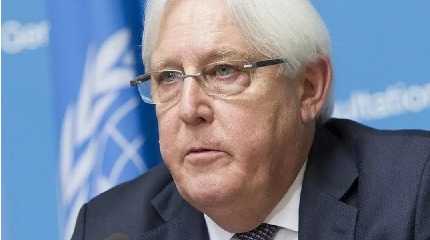
UNITED NATIONS, March 15 (Xinhua) -- UN Undersecretary-General for Humanitarian Affairs and Emergency Relief Coordinator Martin Griffiths on Tuesday warned against inertia and fatigue on the dire humanitarian situation in Yemen.
After more than seven years of war, Yemen is becoming what humanitarians often refer to as a "chronic emergency," he told the Security Council in a briefing. "And, as aid workers know, there are grave risks in chronic emergencies, namely inertia and fatigue. We have to avoid giving in to those forces."
UN Secretary-General Antonio Guterres, together with the president of Switzerland and the foreign minister of Sweden, will host a high-level pledging event for Yemen on Wednesday. Aid agencies are seeking nearly 4.3 billion U.S. dollars to help more than 17 million people across Yemen for this year, said Griffiths.
Yemen suffers globally from the terrible statistic that it has the highest rate of the percentage of its overall population in need. New nationwide assessments done by humanitarians in Yemen confirm that 23.4 million people now need some form of assistance. That is three-quarters of the overall population, he said.
Among them, 19 million will go hungry, and that is an increase of almost 20 percent since last year. More than 160,000 of these people will face famine-like conditions, he said.
Despite many calls for dialogue and a cease-fire, hostilities persist along nearly 50 front lines. Last year, hostilities killed or injured more than 2,500 civilians and forced nearly 300,000 people to flee their homes, bringing the number of internally displaced to 4.3 million people, said Griffiths.
The war has also accelerated Yemen's economic problems, pushing more families into destitution. This collapse is among the largest drivers of humanitarian needs, he said.
Yemen relies on commercial imports for about 90 percent of its food and nearly all its fuel and other essential goods. Many of these goods could soon be much harder to obtain and at a greater cost. About a third of Yemen's wheat comes from Russia and Ukraine, where the current conflict may restrict supply and push up food prices, he warned.
Fuel imports have also fallen sharply through Hodeidah port. Fuel volumes last month were less than half the average. This drop is contributing to fuel shortages and price rises, which are likely to become even more acute as the energy prices globally continue to rise, he said.
All this means that Yemen's import-dependent economy, because of events that have nothing to do with Yemen, is even more fragile now than just a few weeks ago. The Yemeni economy needs the support of the international community, including through foreign exchange injections and other measures, as well as to avoid risking further damage, he said.
Two-thirds of major UN programs have already scaled down or closed in recent months for lack of money, including deep cuts to core services like food aid, water, health care and relief for people fleeing the violence in Marib and elsewhere, said Griffiths.
"So, if we have one message here today, if I have one message today for the world, it is this: Don't stop now. The UN and its members must keep working together to help the millions of Yemenis who urgently need it and who deserve it. They must show that being out of the headlines does not mean being left behind," he said.




